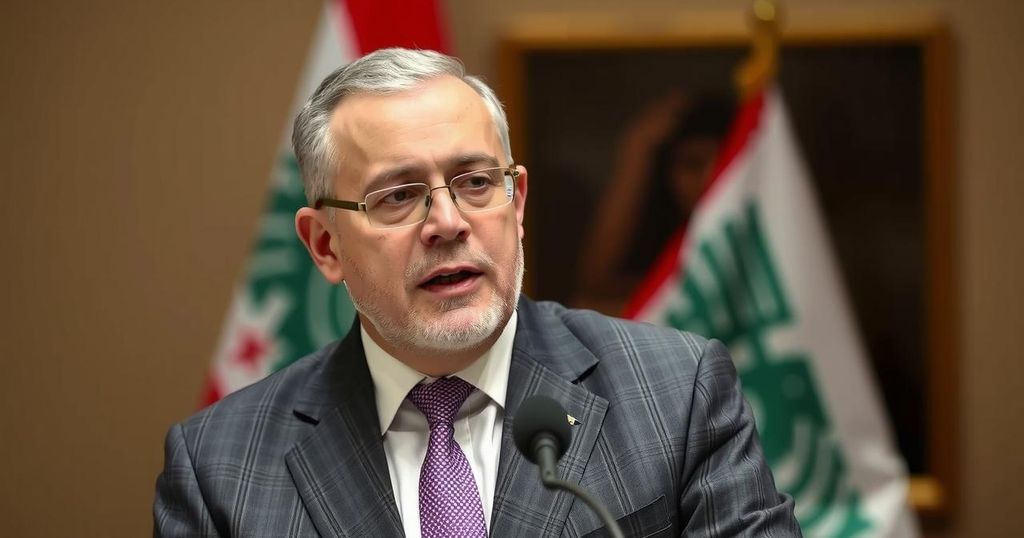Lebanon’s Prime Minister Calls for Urgent Israeli Withdrawal Amid Reconstruction Efforts
Lebanon’s Prime Minister Najib Mikati called for US and French assistance to hasten Israel’s withdrawal from Lebanon following a ceasefire with Hezbollah. He emphasized his commitment to resolving border disputes with Israel and announced plans for reconstruction amid significant damage estimated at $3.4 billion. Mikati expressed sorrow over the destruction in Khiam and highlighted the Lebanese Army’s role in ensuring national security as tensions with Israel persist.
Lebanon’s caretaker Prime Minister Najib Mikati has urged the United States and France to expedite the withdrawal of Israeli forces from Lebanon, following a fragile ceasefire established nearly a month ago between Israel and Hezbollah. While visiting the southern frontlines, Mikati reiterated his dedication to resolving disputes regarding the Blue Line, the United Nations-delineated border, to remove any grounds for Israeli occupation of Lebanese territory. He is collaborating with international partners to establish a trust fund for reconstruction as the country assesses substantial damage from recent conflicts, estimated at $3.4 billion by the World Bank.
Mikati’s visit to Khiam marks the first by a Lebanese official since the Israeli withdrawal, where he observed significant destruction caused by the recent military actions. He expressed deep sorrow for the ruination of homes and infrastructure while emphasizing the immediate need for an Israeli exit from Lebanese territory. Mikati highlighted that the Lebanese Army must be permitted to fulfill its mandate without hindrances, stating that delays in implementing UN Resolution 1701 stemmed from Israeli reluctance rather than military issues on the Lebanese side.
In pursuit of a complete Israeli withdrawal within the 60-day timeframe outlined in the ceasefire agreement, Mikati called for discussions with American and French representatives to address Israeli delays. He affirmed the Lebanese government’s commitment to international law and UN Security Council resolutions, urging skeptics to remain hopeful about achieving peace and stability. Mikati’s plans for reconstruction involve developing a transparent strategy and conducting thorough studies to address the damage inflicted by recent hostilities.
This ceasefire, effective since November 27, followed extensive cross-border conflicts between Israel and Hezbollah that escalated after the Gaza war. During his visit, Mikati paid respects to the Lebanese Armed Forces, commending their resilience in protecting the nation. He expressed hope for an upcoming meeting with military leaders to resolve issues concerning the Lebanese Army’s deployment in light of Israel’s withdrawal.
Afterward, Mikati and military leaders discussed the situation with UNIFIL commanders, who reiterated their role in monitoring the ceasefire and coordinating efforts with the Lebanese Army. Mikati emphasized the importance of halting diminutive violations by Israeli forces and prioritizing the implementation of UN Resolution 1701 to ensure long-term stability in southern Lebanon. His return journey saw him received warmly by local residents, reflecting their steadfastness amidst ongoing regional tensions.
Provocatively, Israeli forces displayed their flag at the Lebanese border town of Naqoura while reinforcing blockades and conducting military operations in southern Lebanon, reminding observers of the region’s fragile security landscape, further complicating the path to lasting peace.
The longstanding conflict between Israel and Hezbollah has its roots in territorial disputes and political struggles within Lebanon and the broader Middle East. The recent fighting, exacerbated by the war in Gaza, has resulted in extensive damage to Lebanese infrastructure and communities, prompting calls for international assistance in reconstruction efforts. The ceasefire, brokered by the United States and France, allowed for the deployment of Lebanese forces and the beginning of a potential resolution to ongoing tensions, but the situation remains precarious, with Israeli military actions continuing to provoke anxiety among the Lebanese populace.
Prime Minister Najib Mikati’s appeal to the US and France underscores Lebanon’s urgent need for stability and reconstruction following extensive destruction caused by recent hostilities. His commitment to resolving border disputes and facilitating the Lebanese Army’s full deployment highlights the complexities of regional security. As the ceasefire holds, international cooperation may be vital to ensuring a lasting peace, yet ongoing Israeli military activities in the region pose significant challenges to achieving this objective.
Original Source: www.arabnews.com




Post Comment